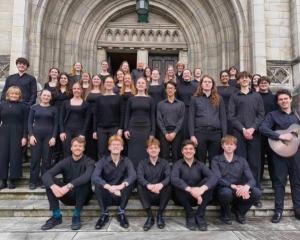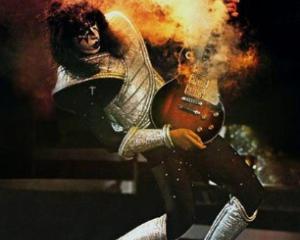
Watching the double bass played in an army band fired a young Umar Zakaria’s imagination.
"I thought it was really cool."
His mother had taken him to the concert to help him discover a new instrument to play.
"I started on the piano. It’s a common story: I hated it, so I never practised."
However, it took a while before he began to learn the bass as he was a shy child and it took him a long time to get up enough courage to approach his teacher.
"That took a couple of months."

When he did, he found the double bass felt very natural.
"Everything fit under my fingers. It didn’t take me long to understand how everything worked. Maybe it was the timing. I was 13, so maybe it was the time to learn something new. I enjoyed the sound of it, I enjoyed the size of it.
"I ended up really loving music and really loving playing jazz."
While jazz was what he wanted to play, he had to learn to play classical music first.
"When I finally got to learn jazz it was so interesting. There was a bit of a mental hurdle. There is a lot of theory and knowledge to get under your feet and learning how different notes sound, so you can just play them without thinking about what note it is so you can improvise.
"That was pretty mentally engaging for me as well."
He enjoys watching people improvise, knowing they are making up something from nothing. "There is a sort of freedom I picked up from being able to make something up or create something that wasn’t there before."
The attraction of jazz is a lot of things for Zakaria, but that freedom is definitely part of it, he says.
"I think to play jazz, you are improvising and making something up, but the muse has to come from somewhere and generally it means the music comes from the people who are making it."
Playing with other musicians, such as Dunedin’s Karin Reid and Alex Wolken, allows him to give back to music. The trio will also play at the Wellington Jazz Festival in November.


"It’s a big part of the pull for me. It’s almost a kind of social thing, I guess."
He met Reid in Wellington when she asked him for a tune when he was playing as part of a house band.
"Like a lot of jazz gigs it starts with a jam session where two musicians meet and play. We developed some idea of each other’s musical world, so when she asked me if I wanted to play with her, I was pretty confident to say yes."
Reid was taken by the double bassist’s playing.
“I knew in an instant his ability for deep listening and dynamic playing. He is passionate and thoughtful about his instrument and music and is renowned for his emotionally stirring performances. I really wanted to perform with him, feeling he would be perfect for our ‘jazz noir’ duo sound and musical personalities. We are very fortunate.”
Zakaria hopes to bring his energy and musical flavour to the gig as well as some intensity.
"With double bass the sound can be sort of quite quiet compared to some instruments, but can take up the whole room."
Travelling with a double bass can be problematic, so it is not unusual for a player to borrow an instrument — as Zakaria will do in Dunedin.
"It’s kind of understood among base players. I do have a gigantic case which can fit a double bass in it, but it’s quite pricey and doesn’t fit in every car. Sometimes it’s better to borrow one."
Wellington has been the musician’s base since 2011, although he has travelled overseas to study and perform.
"I really like it here. I’ve been to Boston and Japan and I’ve been to Berlin. It’s quite unbelievable how much music there is [in Wellington] considering the population of New Zealand. I’m very happy to be here.
"The more I travel, the more I value being here."
After finishing high school in his hometown of Christchurch, he was awarded a scholarship to the New Zealand School of Music.
In his third year, he accepted an opportunity to be an exchange student at the University of NorthTec in Texas, which is famous for its grammy-nominated jazz band.
"That was the place that really kicked my butt for
the first time; it was
very enjoyable, but a very sobering experience."
From there he completed his master’s degree at the New England Conservatory in Boston.
He is a student of legendary jazz bassists Cecil McBee and Lynn Seaton as well as New Zealand’s Paul Dyne, and was awarded second prize at the BASS2014 International Jazz Bass Competition. In 2018, he was named best jazz artist by Recorded Music New Zealand and won a Tui Award for his album Fearless Music.
After returning to New Zealand, he has completed a PhD at Victoria University about Malay composers from Singapore.
Zakaria, who is of Singaporean Malay heritage, believes it is important to know where he came from, just like African American jazz musicians did by going back to Africa to learn about the music that shaped them.
"I heard about that while I was in high school and it has always been in the back of my head that I could study it. I’ve been slowly working up to it and now I’m able to do that."
In Malay music, jazz and double bass possibly have a role in decorating the rhythm, but he is still learning about the links.
"What I’ve found when I play with Malay musicians is that they don’t necessarily play jazz, but they are very comfortable improvising from nothing, on the spot, in the moment."
In 2018, his innovative bass playing was featured on Gelombunk by Malay percussion virtuoso Riduan Zalani.
Zakaria has also performed his own Malay-jazz hybrid compositions in Singapore, with Zalani and traditional accordionist Syafiqah Adha Sallehin.
He has also represented New Zealand as one of three bassists selected from around the world to participate in the Betty Carter Jazz Ahead programme for jazz performer-composers at the Kennedy Center in Washington and attended the Banff International Workshop for Jazz and Creative Music in 2019.
Zakaria also composes, but describes himself as a "very slow composer" normally. However, this year was different.
"I don’t write many things in a year, but now that I think about it I’ve actually written five pieces and four original arrangements."
Those pieces have been for the Arthur St Loft Orchestra as part of the Third Eye Artists Group. It is a programme in which the music of different composers is performed by a variety of ensembles.
His orchestral scores have also been recorded by the New Zealand Symphony Orchestra for the NZSO/Todd Corporation Young Composer Awards in 2008 and 2010, and have been performed by the NZSO and Royal New Zealand Ballet in a collaborative concert in 2012. His jazz orchestra arrangement of Miles Davis’ E.S.P. has been recorded by the New Zealand School of Music Big Band.
He credits the lockdown being good for him as it meant he stayed in one place, although he missed performing during that time.
However, it may have been good practice as he plans to slow down the performing to concentrate on his studies.
"It’s a bit of balance. Maybe keeping the performance going at a steady frequency, but less than it was before."
Then, in the next breath, Zakaria says he is pulling together a collective to take the concept of his Tui Award-winning work Fearless to another level.
"The concept is about facing your personal challenges and try to get over your musical inhibitions and evolve each time you play. Hopefully, it can encourage people in the audience to see that musicians are doing something and maybe we can to."
The Tui award made a lot of difference to the business of his music as it has opened doors that were previously closed to him.
"I’m still Umar, the bassist who’ll play with everybody, but I find people trust me to make great music a lot quicker now."
He has also noticed that jazz in New Zealand was gaining more prominence and interest, something that can be seen in the musicians at the New Zealand School of Music.
"They are getting stronger and stronger at earlier stages. It’s very healthy, I hope it keeps going."












